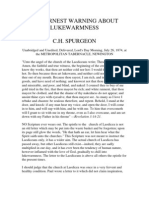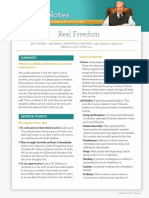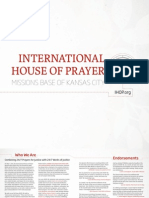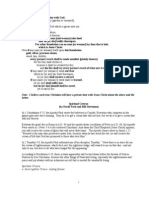The Love of Christ
The Love of Christ
Uploaded by
sherm77Copyright:
Available Formats
The Love of Christ
The Love of Christ
Uploaded by
sherm77Copyright
Available Formats
Share this document
Did you find this document useful?
Is this content inappropriate?
Copyright:
Available Formats
The Love of Christ
The Love of Christ
Uploaded by
sherm77Copyright:
Available Formats
Chapel Library 2603 West Wright St.
Pensacola, Florida 32505 USA
Sending Christ-centered materials from prior centuries worldwide Worldwide: please use the online downloads worldwide without charge. In North America: please write for a printed copy of the 48-page abridgment sent completely without charge. Chapel Library does not necessarily agree with all the doctrinal positions of the authors it publishes. We do not ask for donations, send promotional mailings, or share mailing lists.
Copyright 2000 Chapel Library: annotations.
THE LOVE OF CHRIST
ROBERT MURRAY MCCHEYNE (1813-1843)
Contents
I. Christs Constraining Love ................................................ 2 II. His Love Removes Our Hatred ........................................ 3 III. His Love Stirs Up Our Love ........................................... 4 IV. Christs Persevering Love ................................................ 5
For the love of Christ constraineth us.
2 Corinthians 5:14
Of all the features of St. Pauls character, untiring activity was the most striking. From Pauls early history, which tells us of his personal exertions in wasting the infant Church, when he was a blasphemer, and a persecutor, and injurious, it is quite obvious that this was the prominent characteristic of his natural mind. But when it pleased the Lord Jesus Christ to show forth in him all long-suffering, and to make him a pattern to them which should afterwards believe on Him, it is beautiful and most instructive to see how the natural features of this daringly bad man became not only sanctified, but invigorated and enlarged; so true it is that they that are in Christ are a new creation: Old things pass away, and all things become new. Troubled on every side, yet not distressed; perplexed, but not in despair; persecuted, but not forsaken; cast down, but not destroyed; this was a faithful picture of the life of the converted Paul. Knowing the terrors of the Lord, and the fearful situation of all who were yet in their sins, he made it the business of his life to persuade men; striving if, by any means, he might commend the truth to their consciences. For (he says) whether we be beside ourselves, it is to God; or whether we be sober, it is for your cause (verse 13). Whether the world think us wise or mad, the cause of God and of human souls is the cause in which we have embarked all the energies of our being. Who, then, is not ready to inquire into the secret spring of all these supernatural labours? Who would not desire to have heard from the lips of Paul the mighty principle that impelled him through so many toils and dan1
gers? What magic spell had taken possession of this mighty mind, or what unseen planetary influence, with unceasing power, drew him on through all discouragements, indifferent alike to the worlds dread laugh, and the fear of man; careless alike of the sneer of the skeptical Athenian, of the frown of the luxurious Corinthian, and the rage of the narrow-minded Jew? What does the apostle say himself? We have his own explanation of the mystery in the words before us: The love of Christ constraineth us.
I. Christs Constraining Love
That Christs love to man is here intended, and not our love to the Saviour, is quite obvious, from the explanation which follows, where His dying for all is pointed to as the instance of His love. It was the view of that strange compassion of the Saviour, moving Him to die for His enemies, to bear double for all their sins, to taste death for every man; it was this view which gave Paul the impulse in every labour, which made all suffering light to him, and every commandment not grievous. He ran with patience the race that was set before him. Why? Because, looking unto Jesus, he lived a man crucified unto the world, and the world crucified unto him. By what means? by looking to the cross of Christ. As the natural sun in the heavens exercises a mighty and unceasing attractive energy on the planets which circle round it, so did the Sun of Righteousness, which had indeed arisen on Paul with a brightness above that of noon-day, exercise on his mind a continual and an almighty energy, constraining him to live henceforth no more unto himself, but to Him that died for him and rose again. And observe, that it was no temporary, fitful energy, which it exerted over his heart and life, but an abiding and a continued attraction; for he does not say that the love of Christ did once constrain him; or that it shall yet constrain him; or that in times of excitement, in seasons of prayer, or peculiar devotion, the love of Christ was wont to constrain him. He said simply, that the love of Christ constrains him. It is the ever-present, ever-abiding, ever-moving power, which forms the mainspring of all his working; so that, take that away, and his energies are gone, and Paul is become weak as other men. Is there no one reading this whose heart is longing to possess just such a master-principle? Is there no one who has arrived at that most interesting of all the stages of conversion in which you are panting after a power to make you new? You have entered in at the straight gate of believing. You have seen that there is no peace to the unjustified; and therefore you have put on Christ for your righteousness; and already you feel something of the joy and peace of believing. You can look back on your past life, spent without God in the world, and without Christ in the world, and without the Spirit in the world; you can see yourself a condemned outcast, and you say: Though I should wash my hands in snow-water, yet mine own clothes would abhor me. You can do all this, with shame and self-reproach, it is true, but yet without dismay, and without despair; for your eye has been lifted believingly to Him who was made sin for us, and you are persuaded that, as it pleased God to count all your iniquities to the Saviour, so He is willing, and has always been willing, to count all the Saviours righteousness to you. Without despair, did I say? nay, with joy and singing; for if, indeed, you believe with all your heart, then you are come to the blessedness of the man to whom God imputes righteousness without works; which David describes, saying: Blessed is he whose transgression is forgiven, whose sin is covered. Blessed is the man unto whom the Lord imputeth not iniquity. This is the peace of the justified man. But is this peace a state of perfect blessedness? Is there nothing left to be desired? I appeal to those of you who know what it is to be just by believing. What is it that still clouds the brow, that represses the exulting of the spirit? Why might we not always join in the song of thanksgiving: Bless the Lord, 0 my soul, and forget not all his benefits: who forgiveth all thine iniquities! If we have received double for all our sins, why should it ever be needful for us to argue as does the psalmist: Why art thou cast down, 0 my soul: and why art thou disquieted within me? My friends there is not a man among you who has really believed, who has not felt the disquieting thought of which I am now speaking. There may be some of you who have felt it so painfully, that it has obscured, as with a heavy cloud, the sweet light of gospel peace, the shining in of the reconciled countenance upon the soul. The thought is this: I am a justified man; but, alas! I am not a sanctified man. I can look at my past life without despair; but how can I look forward to what is to come? There is not a more picturesque moral landscape in the universe than such a soul presents. Forgiven all trespasses that are past, the eye looks inward with a clearness and an impartiality unknown before, and there it gazes upon its long-fostered affections for sin, which, like ancient rivers, have worn a deep channel into the heart; its periodic returns of passion, hitherto irresistible and overwhelming, like the tides of the ocean; its perversities of temper and of habit, crooked and unyielding, like the gnarled branches of a stunted oak. What a scene is here; what anticipation of the future! what forebodings of a vain struggle against the tyranny of lust! against old trains of acting, and of speaking, and of thinking! Were it not that the hope of the glory of God is one of the chartered rights of the justified man, who would be surprised if this view of terror were to drive a man back, like a dog to his vomit, or the sow that was washed to wallow again in the mire? Now it is to the man precisely in this situation, crying out at morning and at evening, How shall I be made new? What good shall the forgiveness of my past sins do me, if I be not delivered from the love of sin?it is to that man that we would now, with all earnestness and affection, point out the example of Paul, and the secret power which wrought in him. The love of Christ (says Paul) constraineth us. We, too, are men of like passions with yourselves; that same sight which you view with dismay within you, was in like manner revealed to us in all its discouraging power. Ever and anon the same hide2
ous view of our own hearts is opened up to us. But we have an encouragement which never fails. The love of the bleeding Saviour constrains us. The Spirit is given to them that believe; and that almighty agent has one argument that moves us continuallythe love of Christ. My present object is to show how this argument, in the hand of the Spirit, does move the believer to live unto God; how so simple a truth as the love of Christ to man, continually presented to the mind by the Holy Ghost, should enable any man to live a life of gospel holiness. If there be one man among you whose great inquiry is: How shall I be saved from sin, how shall I walk as a child of God? that is the man of all others, whose ear and heart I amanxious to engage.
II. His Love Removes Our Hatred
The love of Christ to man constrains the believer to live a holy life, because that truth takes away all his dread and hatred of God.
When Adam was unfallen, God was everything to his soul; and everything was good and desirable to him, only in so far as it had to do with God. Every vein of his body, so fearfully and wonderfully made, every leaf that rustled in the bowers of Paradise, every new sun that rose, rejoicing like a strong man to run his race, brought him in every day new subjects of godly thought and of admiring praise; and it was only for that reason that he could delight to look on them. The flowers that appeared on the earth, the singing of birds, and the voice of the turtle heard throughout the happy land, the fig tree putting forth her green figs, and the vines with the tender grapes giving a good smell, all these combined to bring in to him at every pore a rich and varied tribute of pleasantness. And why? Just because they brought into the soul rich and varied communications of the manifold grace of Jehovah. For, just as you may have seen a child on earth devoted to its earthly parent, pleased with everything when he is present, and valuing every gift just as it shows more of the tenderness of that parents heart, so was it with that genuine child of God. In God he lived, and moved, and had his being; and not more surely would the blotting out of the sun in the heavens have taken away that light which is so pleasant to the eyes, than would the hiding of the face of God from him have taken away the light of his soul, and left nature a dark and desolate wilderness. But when Adam fell, the fine gold became dim, the system of his thoughts and likings was just reversed. Instead of enjoying God in everything, and everything in God, everything now seemed hateful and disagreeable to him, just in as far as it had to do with God. When man sinned, then he feared, and hated Him whom he feared; and fled to all sin just to flee from Him whom he hated. So that, just as you may have seen a child who has grievously transgressed against a loving parent doing all it can to hide that parent from its view, hurrying from his presence and plunging into other thoughts and occupations, just to rid itself of the thought of its justly offended father; in the very same way when fallen Adam heard the voice of the Lord God walking in the garden in the cool of the day, that voice which before he sinned was heavenly music in his earsthen Adam and his wife hid themselves from the presence of the Lord God amongst the trees of the garden. And in the same way does every natural man run from the voice and presence of the Lord, not to hide under the thick embowering leaves of Paradise, but to bury himself in cares and business and pleasures and revellings. Any retreat is agreeable, where God is not; any occupation is tolerable, if God be not in the thoughts. Now I am quite sure that many of you may hear this charge against the natural man with incredulous indifference, if not with indignation. You do not feel that you hate God, or dread His presence; and, therefore, you say it cannot be true. But when God says of your heart that it is desperately wicked; when God claims for Himself the privilege of knowing and trying the heart, is it not presumptuous in such ignorant beings as we are to say that that is not true with respect to our hearts, which God affirms to be true, merely because we are not conscious of it? God says that the carnal mind is enmity against God, that the very grain and substance of an unconverted mind is hatred against God, absolute, implacable hatred against Him in whom we live, and move, and have our being. It is quite true that we do not feel this hatred within us; but that is only an aggravation of our sin and of our danger. We have so choked up the avenues of self-examination, there are so many turnings and windings before we can arrive at the true motives of our actions, that our dread and hatred of God, which first moved man to sin, and which are still the grand impelling forces whereby Satan goads on the children of disobedience; these are wholly concealed from our view, and you cannot persuade a natural man that they are really there. But the Bible testifies, that out of these two deadly rootsdread of God and hatred of Godgrows up the thick forest of sins with which the earth is blackened and overspread. And if there be one among you, who has been awakened by God to know what is in his heart, I take that man this day to witness that his bitter cry, in view of all his sins, has ever been: Against thee, thee only have I sinned. If, then, dread of God, and hatred of God, be the cause of all our sins, how shall we be cured of the love of sin, but by taking away the cause? How do you most effectually kill the noxious weed? Is it not by striking at the root? In the love of Christ to man thenin that strange, unspeakable gift of God, when He laid down His life for His enemies, when He died the just for the unjust that He might bring us to Goddo not you see an object which, if really believed by the sinner, takes away all his dread and all his hatred of God? The root of sin is severed from the stock. In His bearing double for all our sins, we see the curse carried away, we see God reconciled. Why should we fear anymore? Not fearing, why should we hate God any-
more? Not hating God, what desirableness can we see in sin anymore? Putting on the righteousness of Christ, we are again placed as Adam was, with God as our friend. We have no object in sinning; and, therefore, we do not care to sin. In the sixth chapter of Romans Paul seems to speak of the believer sinning, as if the very proposition were absurd. How shall we, that are dead to sin, that is, who in Christ have already borne the penaltyhow shall we live any longer therein? And again he says very boldly: Sin shall not have dominion over youit is impossible in the nature of thingsfor ye are not under the law, but under grace; you are no longer under the curse of a broken law, dreading and hating God; you are under grace; under a system of peace and friendship with God. But is there anyone ready to object to me that if these things be so, if nothing more than that a man be brought into peace with God is needful to a holy life and conversation, how comes it that believers do still sin? I answer, it is indeed too true that believers do sin; but it is just as true that unbelief is the cause of their sinning. If you and I were to live with our eye so closely on Christ bearing double for all our sins, freely offering to all a double righteousness for all our sins; and if this constant view of the love of Christ maintained within us, as assuredly it would if we looked with a straightforward eye, the peace of God which passes all understandingthe peace that rests on nothing in us, but upon the completeness that is in Christthen I do say that, frail and helpless as we are, we should never sin; we should not have the slightest object in sinning. But this is not the way with us. How often in the day is the love of Christ quite out of view! How often is it obscured to us! sometimes hid from us by God Himself, to teach us what we are. How often are we left without the realizing sense of the completeness of His offering, the perfectness of His righteousness, and without the will or the confidence to claim an interest in Him! Who can wonder then that, where there is so much unbelief, dread and hatred of God should again and again creep in, and sin should often display its poisonous head? The matter is very plain, if only we had spiritual eyes to see it. If we live a life of faith on the Son of God, then we shall assuredly live a life of holiness. I do not say we ought to do so; but I say, we shall, as a matter of necessary consequence. But in as far as we do not live a life of faith, in so far we shall live a life of unholiness. It is through faith that God purifies the heart; and there is no other way. Is there one of you, then, desirous of being made new, of being delivered from the slavery of sinful habits and affections? We can point you to no other remedy but the love of Christ. Behold how He loved you! See what He bore for you; put your finger, as it were, into the prints of the nails, and thrust your hand into His side; and be no more faithless, but believing. Under a sense of your sin, flee to the Saviour of sinners. As the timorous dove flies to hide itself in the crevices of the rock, so do you flee to hide yourself in the wounds of your Saviour; and when you have found Him, like the shadow of a great rock in a weary land; when you sit under His shadow, with great delight; you will find that He has slain all the enmity, that He has accomplished all your warfare. God is now for you. Planted together with Christ in the likeness of His death, you shall be also in the likeness of His resurrection. Dead unto sin, you shall be alive unto God.
III. His Love Stirs Up Our Love
The love of Christ to man constrains the believer to live a holy life; because that truth not only takes away our fear and hatred, but stirs up our love.
When we are brought to see the reconciled face of God in peace, that is a great privilege. But how can we look upon that face, reconciling and reconciled, and not love Him who has so loved us? Love begets love. We can hardly keep from esteeming those on earth who really love us, however worthless they may be. But when we are convinced that God loves us, and convinced in such a way as by the giving up of His Son for us all, how shall we but love Him, in whom are all excellencies everything to call forth love? I have already shown you that the gospel is a restorative scheme; it brings us back to the same state of friendship with God which Adam enjoyed, and thus takes away the desire of sin. But now I wish to show you, that the gospel does far more than restore us to the state from which we fell. If rightly and consistently embraced by us, it brings us into a state far better than Adams. It constrains us by a far more powerful motive. Adam had not this strong love of God to man shed abroad in his heart; and, therefore, he had not this constraining power to make him live to God. But our eyes have seen this great sight. Before us Christ has been evidently set forth crucified. If really we believe, His love has brought us into peace, through pardon; and because we are pardoned and at peace with God, the Holy Ghost is given us. What to do? Why, just to shed abroad this truth over our hearts, to show us more and more of this love of God to us, that we may be drawn to love Him who has so loved us, to live to Him who died for us and rose again. It is truly admirable to see how the Bible way of making us holy is suited to our nature. Had God proposed to frighten us into a holy life, how vain would have been the attempt! Men have always an idea, that if one came from the dead to tell us of the reality of the doleful regions where dwell in endless misery the spirits of the damned, that that would constrain us to live a holy life; but what ignorance does this not show of our mysterious nature! Suppose that God should this hour unveil before our eyes the secrets of those dreadful abodes where hope never comes; suppose, if it were possible, that you were actually made to feel for a season the real pains of the lake of living agony, and the worm that never dies; and then that you were brought back again to the earth, and placed in your old situation, among your
4
old friends and companions; do you really think that there would be any chance of your walking with God as a child? I doubt not you would be frightened out of your positive sins; the cup of godless pleasure would drop from your hand; you would shudder at an oath, you would tremble at a falsehood, because you had seen and felt something of the torment which awaits the drunkard, and the swearer, and the liar, in the world beyond the grave; but do you really think that you would live to God any more than you did, that you would serve Him better than before? It is quite true you might be driven to give larger charity; yea, to give all your goods to feed the poor, and your body to be burned; you might live strictly and soberly, most fearful of breaking one of the commandments, all the rest of your days: but this would not be living to God, you would not love Him one whit more. You are sadly blinded to your curiously formed hearts, if you do not know that love cannot be forced; no man was ever frightened into love, and, therefore, no man was ever frightened into holiness. But thrice blessed be God, He has invented a way more powerful than hell and all its terrors; an argument mightier far than even a sight of those torments; He has invented a way of drawing us to holiness. By showing us the love of His Son, He calls forth our love. He knew our frame; He remembered that we were dust; He knew all the peculiarities of our treacherous hearts; and, therefore, He suited His way of sanctifying to the creature to be sanctified. Thus, the Spirit does not make use of terror to sanctify us, but of love: The love of Christ constraineth us. He draws us by the cords of love, by the bands of a man. What parent does not know that the true way to gain the obedience of a child, is to gain the affections of the child? And do you think that God, who gave us this wisdom, does not Himself know? Do you think He would set about obtaining the obedience of His children, without first of all gaining their affections? To gain our affections, which by nature rove over the face of the world, and centre anywhere but in Him, God has sent His Son into the world to bear the curse of our sins. Though he was rich, yet for our sakes he became poor, that we, through his poverty, might be made rich. If there is but one of you who will consent this day, under a sense of undoneness, to flee for refuge to the Saviour, to find in Him the forgiveness of all sins that are past, I know well that from this day forth you will be like that poor woman which was a sinner, who stood at Christs feet behind Him weeping, and began to wash His feet with tears and did wipe them with the hairs of her head, and kissed His feet and anointed them with the ointment. Forgiven much, you will love much; loving much, you will live to the service of Him whom you love. This is the grand master-principle of which we spoke; this is the secret spring of all the holiness of the saints. The life of holiness is not what the world falsely represents it, a life of preciseness and painfulness, in which a man crosses every affection of his nature. There is no such thing as self-denial in the Popish sense of that word in the religion of the Bible. The system of restrictions and self-crossings is the very system which Satan has set up as a counterfeit of Gods way of sanctifying. It is thus that Satan frightens away thousands from gospel peace and gospel holiness; as if to be a sanctified man were to be a man who crossed every desire of his being, who did everything that was disagreeable and uncomfortable to him. My friends, our text distinctly shows us that it is not so. We are constrained to holiness by the love of Christ; the love of Him who loved us, is the only cord by which we are bound to the service of God. The scourge of our affections is the only scourge that drives us to duty. Sweet bands and gentle scourges! Who would not be under their power?
IV. Christs Persevering Love
Finally, if Christs love to us be the object which the Holy Ghost makes use of, at the very first, to draw us to the service of Christ, it is by means of the same object that He draws us to persevere even unto the end. So that if you are visited with seasons of coldness and indifference; if you begin to be weary, or lag behind in the service of God, behold! here is the remedy: Look again to the bleeding Saviour. That Sun of Righteousness is the grand attractive centre, round which all His saints move swiftly, and in smooth harmonious concert, not without song. As long as the believing eye is fixed upon His love, the path of the believer is easy and unimpeded; for that love always constrains. But lift off the believing eye, and the path becomes impracticable, the life of holiness a weariness. Whoever, then, would live a life of persevering holiness, let him keep his eye fixed on the Saviour. As long as Peter looked only to the Saviour, he walked upon the sea in safety, to go to Jesus; but when he looked around and saw the wind boisterous, he was afraid, and beginning to sink, cried, Lord, save me! Just so will it be with you. As long as you look believingly to the Saviour, who loved you, and gave Himself for you, so long you may tread the waters of lifes troubled sea, and the soles of your feet shall not be wet. But venture to look around upon the winds and waves that threaten you on every hand, and, like Peter, you begin to sink, and cry, Lord, save me! How justly, then, may we address to you the Saviours rebuke to Peter: 0 thou of little faith, wherefore didst thou doubt? Look again to the love of the Saviour, and behold that love which constrains you to live no more to yourself, but to Him that died for you and rose again.
You might also like
- The Lost Years of JesusDocument11 pagesThe Lost Years of Jesusecruz_yhwh100% (1)
- The Reason For God - The Problem of SinDocument2 pagesThe Reason For God - The Problem of SinDaveNo ratings yet
- Ruqiya MagicDocument28 pagesRuqiya MagicAmadou Sow100% (3)
- Worship in Spirit and TruthDocument21 pagesWorship in Spirit and TruthPrince ADOFO-OTCHERENo ratings yet
- Anatomy of RevivalDocument33 pagesAnatomy of RevivalJeffrey Hall100% (1)
- True Destiny Installation ProgramDocument10 pagesTrue Destiny Installation Programtruedestinycc100% (2)
- John 'Praying' Hyde - A Man of Prayer - There Are Not Many Who Have This Type of Legacy - Read and LearnDocument57 pagesJohn 'Praying' Hyde - A Man of Prayer - There Are Not Many Who Have This Type of Legacy - Read and Learnsherm77100% (13)
- Funeral Pre-Planning Worksheet: A Planning Guide To Assist My FamilyDocument15 pagesFuneral Pre-Planning Worksheet: A Planning Guide To Assist My Familyapi-197969265No ratings yet
- Pilgrimage To Pentecost PDFDocument4 pagesPilgrimage To Pentecost PDFLansing CogicNo ratings yet
- The Life God BlessesDocument7 pagesThe Life God BlessesAlex CastilloNo ratings yet
- SuperNatural LivingDocument11 pagesSuperNatural LivingAbiud OdipoNo ratings yet
- What Does The Bible Say About DeathDocument2 pagesWhat Does The Bible Say About Deathslopzknot100% (1)
- Book 2 Baptize by Blazing Fire EbookDocument104 pagesBook 2 Baptize by Blazing Fire EbookEyemanProphetNo ratings yet
- 2put On The Armour of GodDocument6 pages2put On The Armour of Godapi-280303587No ratings yet
- The Identity of The Holy SpiritDocument29 pagesThe Identity of The Holy Spiritmarconi_7No ratings yet
- The Three HeavensDocument11 pagesThe Three HeavensdispiradohNo ratings yet
- Scriptures On Hearing GodDocument5 pagesScriptures On Hearing GodENIOLA TOSINNo ratings yet
- What Does It Mean To Be Filled With The Holy SpiritDocument3 pagesWhat Does It Mean To Be Filled With The Holy SpiritAkatwijuka AllanNo ratings yet
- Three Kinds of Sons Hear The Word - Natural, Spiritual & Carnal (Spiritual Man Part 3)Document10 pagesThree Kinds of Sons Hear The Word - Natural, Spiritual & Carnal (Spiritual Man Part 3)Randolph BarnwellNo ratings yet
- An Earnest Warning About LukewarmnessDocument15 pagesAn Earnest Warning About Lukewarmnessitisme_angelaNo ratings yet
- Three Faces of a Miracle: A Family Transformed by God’S Healing PowerFrom EverandThree Faces of a Miracle: A Family Transformed by God’S Healing PowerNo ratings yet
- Different Metaphors of Intimacy The Vine RelationshipDocument5 pagesDifferent Metaphors of Intimacy The Vine RelationshipBenalin C RNo ratings yet
- Cheryl Thomson A Vineyard MemoirDocument10 pagesCheryl Thomson A Vineyard MemoireltropicalNo ratings yet
- Halloween Sunday School LessonDocument10 pagesHalloween Sunday School LessonMarisa MoseskhanNo ratings yet
- Glory of Living, The - Myles MunroeDocument133 pagesGlory of Living, The - Myles MunroeTASFAYE FIKADUNo ratings yet
- The Triumphant Church: What Happens when Ordinary People Are Empowered by an Extraordinary GodFrom EverandThe Triumphant Church: What Happens when Ordinary People Are Empowered by an Extraordinary GodNo ratings yet
- A Letter From Your Heavenly FatherDocument1 pageA Letter From Your Heavenly FatherPatriotic PilipinoNo ratings yet
- New Apostolic ReformationDocument21 pagesNew Apostolic ReformationGeorge Milner100% (1)
- Be A Doer of The Word - White HandoutDocument14 pagesBe A Doer of The Word - White HandoutyapbengchuanNo ratings yet
- ToxicDocument346 pagesToxicAndreea HavrișciucNo ratings yet
- God Has Purpose for You: Allowing the Spirit to Lead You to Divine DestinyFrom EverandGod Has Purpose for You: Allowing the Spirit to Lead You to Divine DestinyNo ratings yet
- Sermon Notes: Real FreedomDocument2 pagesSermon Notes: Real FreedomYasonsky Captain100% (1)
- Amazing Grace & John NewtonDocument2 pagesAmazing Grace & John Newtonxal22950No ratings yet
- IHOP-KC Overview BookDocument13 pagesIHOP-KC Overview BookEliezer Correia100% (1)
- The Healing Ministry of Jesus As Recorded in The Synoptic GospelsDocument89 pagesThe Healing Ministry of Jesus As Recorded in The Synoptic GospelsMichael100% (2)
- Prayer - Luke 11 V 1Document20 pagesPrayer - Luke 11 V 1KingsNo ratings yet
- Genesis 39:1-23 - OVERCOMING TEMPTATIONDocument8 pagesGenesis 39:1-23 - OVERCOMING TEMPTATIONCalvary Tengah Bible-Presbyterian ChurchNo ratings yet
- The 3 Parts of ManDocument4 pagesThe 3 Parts of ManMAHALI DUMAGSANo ratings yet
- Be Still and Know: A Collection of Inspirational Poetry and Memorable MomentsFrom EverandBe Still and Know: A Collection of Inspirational Poetry and Memorable MomentsNo ratings yet
- What Is The Role of The Holy Spirit in Our Lives TodayDocument2 pagesWhat Is The Role of The Holy Spirit in Our Lives TodayManuelNo ratings yet
- God's Power To TransformDocument49 pagesGod's Power To TransformDaniel AbrahamNo ratings yet
- Jabbok by David WilkersonDocument9 pagesJabbok by David Wilkersonsilbithomas100% (1)
- Intercessory PrayerDocument6 pagesIntercessory PrayerAnonymous 6fO24IdYjBNo ratings yet
- In The Hands of GodDocument3 pagesIn The Hands of Goddaniel_1973No ratings yet
- Malachi 3:6 I The Lord Do Not Change. So You, O Descendants of Jacob, Are Not DestroyedDocument2 pagesMalachi 3:6 I The Lord Do Not Change. So You, O Descendants of Jacob, Are Not DestroyedEva Ruth MedilloNo ratings yet
- Bride 5 PDFDocument14 pagesBride 5 PDFJasmin BaruzoNo ratings yet
- Holy MondayDocument1 pageHoly MondayRena Jocelle NalzaroNo ratings yet
- Decision Making and The Will of GodDocument6 pagesDecision Making and The Will of GodScott BirdNo ratings yet
- How To PrayDocument3 pagesHow To Pray2210889No ratings yet
- Notes To Reader - The Book of ActsDocument2 pagesNotes To Reader - The Book of ActsKarina LoayzaNo ratings yet
- Are The Miraculous Gifts For Today Topical - Miraculous - GiftsDocument6 pagesAre The Miraculous Gifts For Today Topical - Miraculous - GiftsRoberto SollaNo ratings yet
- Letter To Governor With SignaturesDocument7 pagesLetter To Governor With SignaturesAdrian Mojica50% (2)
- The Fullness of FaithDocument4 pagesThe Fullness of FaithTMOT - The Message of TransfigurationNo ratings yet
- 2 - Spiritual Crowns Info ETRSDocument3 pages2 - Spiritual Crowns Info ETRSBible_lover_BillNo ratings yet
- 155 Anchored in Christ The WordDocument4 pages155 Anchored in Christ The WordJake HokeyNo ratings yet
- Seeking God LifestyleDocument68 pagesSeeking God LifestyleTanya Owens0% (1)
- Beloved, Yet AfflictedDocument3 pagesBeloved, Yet Afflictedsherm77No ratings yet
- Adoniram Judson & The Missionary CallDocument20 pagesAdoniram Judson & The Missionary Callsherm77100% (1)
- The PSK and Digital Interface: HandbookDocument64 pagesThe PSK and Digital Interface: Handbookhector.pascal578100% (1)
- The 4 Element Hentenna Beam For 2 Meters by N5NNSDocument7 pagesThe 4 Element Hentenna Beam For 2 Meters by N5NNSsherm77No ratings yet
- Amateur Radio Band Plan - Ham RadioDocument2 pagesAmateur Radio Band Plan - Ham Radiosherm77100% (1)
- Covenant Eyes Your Brain On PornDocument17 pagesCovenant Eyes Your Brain On Pornsherm77100% (1)
- Keeping Guinea FowlDocument7 pagesKeeping Guinea FowlgorusssNo ratings yet
- Is God Eternal?Document2 pagesIs God Eternal?Yousuf M Islam100% (3)
- Teologie XVI PDFDocument239 pagesTeologie XVI PDFAnonymous 1ew6BANo ratings yet
- Lecture Notes: Sacrosanctum Concilium - Fr. John Melnick March 5, 2013Document8 pagesLecture Notes: Sacrosanctum Concilium - Fr. John Melnick March 5, 2013mycatholicvoice.com100% (1)
- The Struggle of Islam in Modern IndonesiaDocument292 pagesThe Struggle of Islam in Modern IndonesiaDonald Qomaidiansyah TungkagiNo ratings yet
- Cagliostro MasonryDocument10 pagesCagliostro Masonryjordan_bruno0% (1)
- Wisdom BooksDocument1 pageWisdom BooksnicNo ratings yet
- Shankara's Date (Revised (Unpublished) 1983)Document177 pagesShankara's Date (Revised (Unpublished) 1983)BySarathy67% (3)
- On The Three EvilsDocument25 pagesOn The Three EvilsElleybe100% (1)
- JihadDocument3 pagesJihadAkram KhanNo ratings yet
- Sihr 1Document36 pagesSihr 1Bee Jay JayNo ratings yet
- Life of St. Thomas AquinasDocument4 pagesLife of St. Thomas AquinasGarsha HaleNo ratings yet
- Oblate Newsletter Summer 2014Document12 pagesOblate Newsletter Summer 2014SJAdminNo ratings yet
- Historicity of The Resurrection, Some BasicsDocument2 pagesHistoricity of The Resurrection, Some BasicsNick HillNo ratings yet
- Compassionate Pastor July 2011Document48 pagesCompassionate Pastor July 2011RFC MascarenhasNo ratings yet
- Prayer Points - March 6th 2023Document3 pagesPrayer Points - March 6th 2023Andrew HunterNo ratings yet
- Dasa WismaDocument43 pagesDasa Wismafatmalatif36No ratings yet
- The Spiritual Journey of Jimmy Flynn - Banished Prophet To The People of HopeDocument58 pagesThe Spiritual Journey of Jimmy Flynn - Banished Prophet To The People of HopeJohn Flaherty100% (3)
- Charlene Gillespie Funeral ProgramDocument2 pagesCharlene Gillespie Funeral ProgramHerb WalkerNo ratings yet
- Re Past Paper 1 2021 (5491)Document40 pagesRe Past Paper 1 2021 (5491)WaenNo ratings yet
- Final Paper Sacramental TheologyDocument4 pagesFinal Paper Sacramental TheologyVirtus KenoiNo ratings yet
- American Atheist Magazine Second Quarter 2011Document25 pagesAmerican Atheist Magazine Second Quarter 2011American Atheists, Inc.No ratings yet
- Islamic Study 1Document58 pagesIslamic Study 1javaid AliNo ratings yet
- Nature of The Taiping MovementDocument7 pagesNature of The Taiping MovementHarshita SaxenaNo ratings yet
- Religious Intolerance As A Source of Violence - Udo SchaeferDocument4 pagesReligious Intolerance As A Source of Violence - Udo SchaeferGamal H. M. HassanNo ratings yet
- The Catholic Church Has The AnswerDocument21 pagesThe Catholic Church Has The AnswerJerald Franklin ArcherNo ratings yet
- Basis For AuthorityDocument5 pagesBasis For AuthorityANTONIO ROMAN LUMANDAZNo ratings yet
- .Archivetemp3-Month Planner - US Letter SizeDocument5 pages.Archivetemp3-Month Planner - US Letter SizeIfas SNo ratings yet

































































































